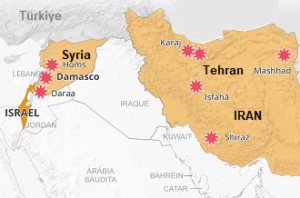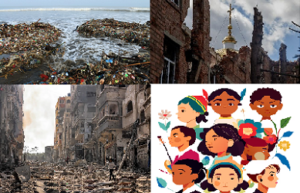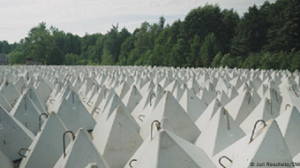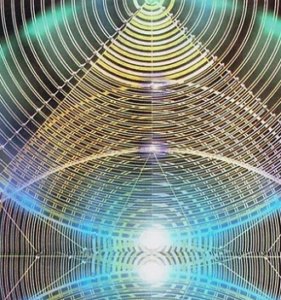
Arquivo para October, 2024
If the night of humanity comes
What to do if the crisis of civilization reaches its human limits and continues to humanize itself? In previous posts, we discussed Edgar Morin’s awareness of “our earthly purposes” in chapter 4 of his book Earth and Homeland
its human limits and continues to humanize itself? In previous posts, we discussed Edgar Morin’s awareness of “our earthly purposes” in chapter 4 of his book Earth and Homeland
It is here that the author also addresses the apparent paradox: conversation/revolution, it is about understanding change without abandoning the main humanitarian principles: “Awareness of our terrestrial roots and our planetary destiny is a necessary condition for realizing humanity and civilizing the Earth” (Morin, 2003, p. 99) because the adjective “revolutionary” has become reactionary and heavily tainted with barbarism” (idem).
The author goes on to say: “Another problem arises here: is there a power of ideas over reality, which would presuppose a reality and a power of ideas? As we have already shown, ideas and myths acquire reality, impose themselves on spirits and can even impose themselves on historical reality, violating it, diverting it” (Morin, 2003, p. 126) and this is very relevant in the current context.
This is complemented by Morin when he points out that “conserving/revolutionizing: it is the paradox of progressing/resisting”, where resisting is “being on the defensive on all fronts against the returns and manifestations of the great barbarism, written before the new millennium, this is very current in the face of the possibility of war.
Morin wrote at that time, which today is the fulfillment of a prophecy: “The spring of the people of 1989-1990 suffered a freeze. All its seeds of freedom are on the verge of destruction. The great barbarism makes a great return” (Morin, 2003, p.100).
Resisting now then means not abandoning humanitarian values, also nowadays Morin spoke about “resistance of the spirit” which is preserving within ourselves the most cherished values of life, humanism and belief in truly “divine” values.
Not believing that we were made for war, for barbarism and have a cruel destiny, although the world outlook is bleak, we must resist with the armor of peace.
Morin, Edgar & Kern, Anne-Brigitte (2003). Terra-Pátria. Transl. Paulo Azevedo Neves da Silva. Brazil, Porto Alegre: Sulina.
The crisis of simplistic thinking and the complex
The epistemology of complexity is a branch of epistemology that studies complex systems and associated emergent phenomena. In some environments, such as mechanics and physics, there has been a tendency to delve deeper into what until then had only been called dynamic systems, and now non-linear or chaotic systems.
of epistemology that studies complex systems and associated emergent phenomena. In some environments, such as mechanics and physics, there has been a tendency to delve deeper into what until then had only been called dynamic systems, and now non-linear or chaotic systems.
The process of industrialization provided great support for a hitherto unthinkable development of the natural sciences, then the generation of technologies: steam and combustion, then electricity, and everything seemed to move in perfect gear.
Until a certain moment, everything was characterized by a movement that Edgar Morin called breaker-and-reducer, both in the sciences and in the arts, the idea of reducing what is complex to the simple (for example, looking for a reality in the smallest part of physics until then, the atoms) that gradually became complex (sub-particles in increasingly microscopic dimensions until reaching the quantum universe).
The particularities of subatomic physics introduced uncertainties and showed the limits of reductionism, which was leading to a distorted view of reality, showing its uncertainties and naivety, the pretension of capturing an objective reality that could be independent of the observer, when the observer himself is part of the phenomenon.
So this reductionist logic of physics was extended to the social and personal universe, and apparently simple mechanisms could solve problems that are complex, and all the problematization resulting from this reality was not observed.
Complex thinking is not limited to the academic world, it overflows and is present in various sectors of society, as well as simplistic reasoning that does not take into account the complexity and diversity of social life.
Even in the spiritual world (or subjective, as you might think, when we see objects outside the reality of the subject) this misunderstanding leads us to a wide door, where the basic values of humanism can be ignored and life fragmented.
Thus the door through which simplistic and trivial logics pass leads to great and problematic mistakes, while the complexity of a socially just and true path is not reduced to simplistic and unhuman ideological forms.
Passing through the narrow door will never be an easy path, but it is the only one that can lead humanity to a sustainable and truly human future of peace, fraternity and social values that respect human dignity.
Beyond “generous” fraternity
Edgar Morin’s book, in chapter 3, explores the “biological sources of fraternity: mutual aid”, addresses the misinterpretation of social Darwinism, “The Origin of Species by Means of Natural Selection” (1859-1860), as well as other authors in his book Method 2 “The Life of Life”, where he points out that there is a solution to the problem between cooperation and conflict, in order to understand societies as well.
“biological sources of fraternity: mutual aid”, addresses the misinterpretation of social Darwinism, “The Origin of Species by Means of Natural Selection” (1859-1860), as well as other authors in his book Method 2 “The Life of Life”, where he points out that there is a solution to the problem between cooperation and conflict, in order to understand societies as well.
Thus, he responds to this “complex relationship”, present in all societies, there is a “complementary and antagonistic (dialogical) relationship between solidarity and conflict.
The fourth chapter opens with the philosophy of Heraclius (540-470 B.C.) “Concord and discord: father and mother and all things”. The author uses the idea of the universe itself: its formation, development, dispersion and death, further supported by the discoveries of the James Webb mega telescope (the book is older) and today with the expansion of the worldview it is confirmed.
The fifth chapter finally arrives at a more complex conception of fraternity, for Morin the three notions: paternity, maternity and fraternity, argues that, unlike what patriarchal society has shown, the concept of father is late in the history of humanity.
He recalls that the idea of male (father) and female (mother) is not a universal concept for all of nature, and with this the relationship of brotherhood (a more horizontal concept of fraternity) is what should prevail, but he recalls that the concepts of birth and dependence are very important for mutualism and cooperation, which are present in all forms of life.
To develop the sixth chapter, he draws on personal experiences, and recalls that the spheres of fraternity within a family are the origin of the external fraternities that we find in social relationships throughout life.
The author’s experiences will become more explicit in Chapter 7 “My Fraternities”, which are the author’s experiences and a short, inspiring chapter that clarifies the author’s position on such an important topic in the dramatic context of civilization in which we live.
The author thus presents what he calls, in chapter 10, an “Oasis of Fraternity”, where modern society, of globalization, opposes the reduction of human life to only a “techno-economic” dimension that reduces the human to a particular, more material dimension of life.
Long before the current crisis, which Morin seemed to anticipate, he will write in the final chapters “Changing paths?” where our social environmental problems are a response to Sapiens demens (linked only to technology, transhumanism and now artificial intelligence), only a radical change of path can we recover serenity, peace and a return to the civilizing process.
Morin, E. (2019) Fraternidade: para resistir à crueldade do mundo, trad. Edgar de Assis Carvalho, Brazil, SP: São Paulo, Ed. Palas Athena.
The War scalated
At the weekend, Israel retaliated against the attacks of the 1st. October when Iran launched around 200 missiles against Israel, following the death of the leader of the extremist group Hezbollah Hassan Nasrallah, the targets apparently were all military bases and Iran mourned the death of 4 soldiers.
attacks of the 1st. October when Iran launched around 200 missiles against Israel, following the death of the leader of the extremist group Hezbollah Hassan Nasrallah, the targets apparently were all military bases and Iran mourned the death of 4 soldiers.
The targets are also unclear, but there are reports from the Syrian cities of Homs, Damascus (capital) and Daraa, in Iran the cities of Karaj (outskirts of Tehran), the cities of Mashhad, Isfahã and Shiraz (graphic), to Last night (27/10) few retaliations from Iran took place.
However, with the direct involvement of Iran and Israel, the climate in the region is explosive and has already escalated.
Also in Russia, North Korean soldiers were sent to reinforce the war in Ukraine, in addition to the training that will be received, many, according to Ukrainian sources, will also be sent to the invaded region of Kursh, where Ukraine maintains dominance, this involvement It also affected South Korea, with which it has the biggest disputes.
Involvement was also projected at the Brics meeting held in Kazan, the formation of an economic bloc is one of the ways to face the various forms of blockades made to countries that are at war or under military dictatorships, not surprisingly, they are involved in wars.
There is still hope for peace, always for those who do not want authoritarian and warlike solutions, even though the problems involved are serious, but wars do not solve them and in most cases they worsen possible sustainable solutions.
We pointed out in the last post, rereading Edgar Morin, we highlight his chapter Conservar/Revolucionar from his book Terra-Pátria, where he emphasizes that we cannot move to a new future horizon by abandoning the humanistic achievements already achieved, human rights, democratic freedoms and cultural-religious tolerance of all ethnicities.
We always hope for a turnaround, even in this serious situation, there is a need for resistance of the spirit, that is, where fundamental human values are assured.
Conserving/revolutionizing and resisting
What to do if the crisis of civilization reaches human limits and continues to humanize itself ?
human limits and continues to humanize itself ?
Edgar Morin’s answer can be found in chapter 4 of the book Earth-Land when he sets out “Our terrestrial goals”, where he states: “Awareness of our terrestrial roots and our planetary destiny is a necessary condition for realizing humanity and civilizing the Earth” (Morin, 2003, p. 99), and stresses that the former is conservative and neglects “deliberately here the adjective ‘revolutionary’, which has become reactionary and very tainted with barbarism” (idem) and it is enough to see the atrocities of the escalation of current wars.
Conservative because “it is a question of preserving, of safeguarding not only the cultural and natural diversities degraded by inexorable processes of standardization and destruction, not only the civilizational conquests threatened by the returns and manifestations of barbarism” (idem p. 99) we cannot regress in the civilizational milestones we have already reached, but we must evolve.
It’s a paradox, but a justifiable one: “Conservation needs the revolution that would ensure the pursuit of hominization” (Morin, 2003, p. 100) where the paradox “apparently contradictory, conserve/revolutionize: it is the paradox progress/resist” (idem), where resisting is “being on the defensive on all fronts against the returns and manifestations of the great barbarism, written before the new millennium, this is very current in the face of the possibility of war.
To resist, for the author, is to oppose two growing barbarities: the “hateful cruelty” that expresses itself “in murder, torture, individual and collective rages” and the “anonymous cruelty that comes from the techno-bureaucratic barbarity” of assumed or presumed totalitarian states.
Thus, the author, who speaks of “hyper-specialization”, “anonymization, abstraction, commodification, which together lead to the loss not only of the global”, sees the imperative need to resist this mentality, which necessarily leads to barbarism and the process of degradation.
Thus the search “for hominization must be conceived as the development of our psychic, spiritual, ethical, cultural and social potentialities” (p. 101) is part of this paradox of resisting/revolutionizing, so development must be conceived in an anthropological way, i.e. “breaking with the conception of progress as a historical certainty in order to make it an uncertain possibility…” (p. 102).
And he adds that he must “understand that no development is acquired forever: like all living and human things, it suffers the attack of the principle of degradation and needs to be constantly regenerated” (p. 102) and points out the false idea of development, because “: the underdevelopment of the developed increases precisely with their techno-economic development” (p. 104), war and conflict are precisely the “developed”.
Thus the notion of underdevelopment: “however barbaric it may be, it establishes an anthropological link between the so-called developed and the so-called underdeveloped; it encourages useful technical and medical aid – drilling wells, developing energy sources, fighting endemic diseases and nutritional deficiencies – even though it is carried out under conditions of economic exploitation, natural degradation and miserable urbanization that cause new evils” (p. 105).
It is therefore necessary to “tolerate” differences and even establish advantages over them, to no longer ignore or demonize different cultures, to establish aid and agreements for global development and the process of broad humanization, which the author calls “hominization”.
Morin, Edgar Morin & Kern, Anne-Brigitte. (2003) Terra-Patria. Transl. Paulo Azevedo Neves da Silva. Brazil, Porto Alegre : Sulina.
A new Copernican revolution
The center of our universe is no longer the sun, at the center of our galaxy there is a black hole, although the name seems to be negative, according to new theories after the James Webb super telescope it is just a new reality beyond current physical thinking, called Sagittarius A* it has a diameter of 35 million kilometers and is the most massive object in the galaxy (first photo taken in 2017 by the Event Horizon telescope, Feryal Ozel).
at the center of our galaxy there is a black hole, although the name seems to be negative, according to new theories after the James Webb super telescope it is just a new reality beyond current physical thinking, called Sagittarius A* it has a diameter of 35 million kilometers and is the most massive object in the galaxy (first photo taken in 2017 by the Event Horizon telescope, Feryal Ozel).
Edgar Morin points out that this and other scientific changes of our century are more “formidable” than the apparently revolutionary ideas of our time, which have changed little or nothing in the social, human and world conception we still have.
Morin wrote: “We have had to abandon an ordered, perfect, eternal universe for a universe in dispersive becoming, born in irradiation, in which order, disorder and organization act dialogically, that is, in a complementary, competing and antagonistic way” (Morin, 2003, p. 62), and also: “we are in a universe that is neither banal, nor normal, nor evident” (p. 63) and we should also think of human and social life in this way.
Thus, our tiny home in an almost infinite universe is “… a small cosmic wastebasket transformed in an improbable way not only into a very complex star, but also into a garden, our garden” (p. 64) and this is how we should think and not about conflicts.
“Our terrestrial family tree and our terrestrial identity card can now finally be known” (p. 64) and points to this as evidence of our problems.
The first piece of evidence he points to is economic unruliness: “We cannot consider the economy as a closed entity. It is an autonomous instance dependent on other instances (sociological, cultural, political), which are also autonomous/dependent in relation to each other” (p. 65), so the current wars are nothing more than a dispute over markets where we could recognize the interdependence and autonomy of each economy.
The second is the ecological crisis: the Meadows report commissioned by the Club of Rome in 1972, but also: “the great local catastrophes with far-reaching consequences: Seveso, Bhopal, Three Mile Island, Chernobyl, drying up of the Sea of Arai, pollution of Lake Baikal, cities on the verge of suffocation (Mexico, Athens)” and now more recently Fukushima and natural disasters.
He also pointed to the crisis of development and the universal crisis of the future, the one we are in today, with hatreds and world wars escalating where love and fraternity are suffocated.
“Thus, everywhere, the development of the science/technology/industry triad loses its providential character. The idea of modernity remains all-conquering and full of promise wherever there are dreams of well-being and liberating technical means” (p. 76).
Without a return to common sense, global cooperation, fraternity the crisis is inevitable.
MORIN, Edgar e Kern, Anne-Brigitte. (2003) Terra-Patria. Transl. Paulo Azevedo Neves da Silva. Brazil, Porto Alegre.
The cosmos, the noosphere and perdition
In the chapter on “The loss of salvation, the unknown adventure” in Edgar Morin’s book Terra-Patria, he takes a deep look at our lack of cosmovision and the perdition of our microscopic concerns that don’t look at the larger world and reality around us.
unknown adventure” in Edgar Morin’s book Terra-Patria, he takes a deep look at our lack of cosmovision and the perdition of our microscopic concerns that don’t look at the larger world and reality around us.
He says at the beginning: “If there were space navigators, their route in the Virgo cluster would ignore the very marginal Milky Way and pass far from the small peripheral sun that orbits the tiny planet Earth. Like Robinson on his island, we set out to send signals towards the stars, so far in vain, and perhaps in vain forever. We are lost in the cosmos” (Morin, 2003, p. 163).
He adds: “This world that is ours is very fragile at the base, almost inconsistent: it was born of an accident, perhaps of a disintegration of the infinite, unless we consider that it arose from nothing” (idem, p. 163).
But in modern times, man has made his ego bigger, he wants to be a kind of “Homo Deus” using the metaphor of Yuval Harari, whose subtitle is “a brief history of tomorrow”, also pessimistic like Morin, but the author of Terra-Pátria hopes that man will find a new, more promising future.
Morin recognizes that “Life, consciousness, love, truth and beauty are ephemeral… We are on the move. We are on the move. We are not marching along a demarcated path, we are no longer guided by the law of progress, we have neither messiah nor salvation, we walk in the night and in the fog” (pgs. 164), he adds: “We are on an unknown adventure. The dissatisfaction that makes the journey begin again could never be satisfied by this. We must assume uncertainty and restlessness, we must assume dasein, the fact that we are there without knowing why” (p. 166), recalling this category dear to Heidegger, who elaborated on the ‘forgetfulness of being’.
How to start the journey again, we might ask, the author gives a “good news-bad news” (recalling the good news meaning of the word Gospel): “Here is the bad news: we are lost, irretrievably lost. If there is a gospel, that is, good news, it must start from the bad news: we are lost, but we have a roof, a house, a homeland: the small planet where life has created its garden, where humans have formed their home, where from now on humanity must recognize its common home (p. 166), and the response, even if agnostic, is no different from the evangelical one.
And then he recalls this call: “The call to fraternity is not confined to one race, one class, one elite, one nation. It comes from those who, wherever they are, hear it within themselves, and it is addressed to each and every one. Everywhere, in every class, in every nation, there are beings of ‘good will’ who convey this message” (Morin, 2003, p. 167).
And those of us who know this message, this hope, must not remain silent, indifferent or, what is much worse, adhere to hopelessness. We must remember that Gospel message: “To whom much has been given, much will be required” (Luke 12:39-48) under penalty of omission, distortion or abandonment of the fundamental message of earthly and heavenly salvation.
MORIN, Edgar and Kern, Anne-Brigitte. (2003) Terra-Patria “Earth-Patria”. Transl. Paulo Azevedo Neves da Silva. Brazil, Porto Alegre : Sulina.
Identity and the human family
We have regional identities and cultures, linked to nations. The fact that nationalities exist should not be contrary to the existence and vision of a human family, not just because of our genetic and animal identity, but mainly because of our common life and relationships.
to nations. The fact that nationalities exist should not be contrary to the existence and vision of a human family, not just because of our genetic and animal identity, but mainly because of our common life and relationships.
Edgar Morin, in his book Terra-Pátria (Editora Sulina, 2003) traces the origins of a vision of man linked to nature (and consequently to the Cosmos), which will unfold in the visions of Bacon, Descartes, Buffon and Marx (Morin, 2003, p. 54) who made man “an almost supernatural being who progressively assumes the empty place of God” (idem), but this triggered an arrogant and authoritarian vision before the Cosmos and the Other.
As a result, we have regressed in our planetary vision: “The identity of man, that is, his complex unity/diversity, has been concealed and betrayed, at the very heart of the planetary era, by the specialized/compartmentalized development of the sciences” (p. 61), a xenophobic vision of nationalism and identity now explodes, inhibiting a vision of the human family.
Morin writes: “Nation and ideology have built new barriers, aroused new hatreds. The Islamist, the capitalist, the communist, the fascist are no longer human. “ (p. 60), note that this was written in 1993 (the original first edition in French).
Our vision of man has narrowed, Morin points out: “Philosophy, locked in its higher abstractions, has only been able to communicate with the human in experiences and existential tensions such as those of Pascal, Kierkegaard, Heidegger, without, however, ever being able to link the experience of subjectivity to anthropological knowledge” (idem, p. 61), the vision of these authors seems ethereal.
This has also happened in the humanities: “Anthropology, a multi-dimensional science (articulating within it the biological, the sociological, the economic, the historical, the psychological) that would reveal the complex unity/diversity of man, cannot really be built unless it is correlated with the meeting of disciplines … “ (pg. 62), and so the human fragment is translated into fragmented thought.
It is this fragmentation translated into war and hatred that demands an unveiling of Being, called for by Heidegger and thinkers who followed him (Hans-Georg Gadamer, Hannah Arendt and others), and which is also thought of by Morin: “Hence the primordial need to unveil, to reveal, in and through its diversity, the unity of the species, human identity, anthropological universals” (p. 60), to unveil (rather than re-veil, which is to veil again) as modern ontology says.
The human family can be unveiled in its common interests: ecology, economic balance and, above all, peace.
Morin, Edgar Morin & Kern, Anne-Brigitte. (2003) Terra-Patria. Transl. Paulo Azevedo Neves da Silva. Brazil, Porto Alegre : Sulina.
Dilemmas about peace in Europe and the Middle East
The first major dilemma, although quite obvious, has no support in the mainstream international press: there is a lack of forces that want peace in a way that is equidistant from the countries in conflict.
obvious, has no support in the mainstream international press: there is a lack of forces that want peace in a way that is equidistant from the countries in conflict.
The UN could once play this role, but with infighting between the major powers, this power is limited to speeches and attempts to sensitize the warring parties.
The second major dilemma stems from a serious misconception that is common among warmongers: if you want peace, prepare for war, but the opposite is true: if you want peace, fight for it.
In Eastern Europe, for example, it was reported in the German press that Estonia, which has only 6,500 active military personnel and a population of 1.3 million, had recently simulated an evacuation plan to withdraw the population, although 60% of the citizens say they are willing to defend the country, they have no military preparation for this.
A curious defense structure has been set up on the border of many Baltic countries (photo from the German newspaper DW – Deutsche Welle). It’s not known how effective it will be, but it’s for war, and the proximity of Ukraine and Russia is making several Baltic countries prepare for the worst.
In the midst of Israeli attacks and little public aid, activist forces in Lebanon are taking action, albeit politicized and insufficient for the people in need, according to the same DW newspaper, the Syrian military and opposition forces charge exorbitant amounts for the transport of refugees fleeing the war.
This leads to a third serious dilemma: the red cross and the red crescent (the Arabic version of the red cross) do not accept the religious controversy, but it is this that divides aid forces.
The fourth dilemma is to resolve the ideological and cultural-religious background to the conflicts. During the Cold War (USA vs. Soviet Union), the sociologist Raymond Aron uttered a well-known phrase: “The Cold War was a period in which war was improbable and peace impossible.” The dilemma is now reversed: “Peace is improbable and war is possible.” The imperialist forces at play will not easily give up their disputed interests.
How to think about peace seems like an arid and impractical path, but great thinkers have called for it: “the resistance of the spirit” and as a consequence “the resistance of hope”, Edgar Morin among others point to this path, perhaps the only one to change the mentality of power, to think about solidarity and serving all of humanity, not one group of interest.
Power, Anger and Time
At a time of threats and hatreds that call into question not only peoples, nations and cultures, but even the process of civilization, it is good to review what we think of power and anger.
question not only peoples, nations and cultures, but even the process of civilization, it is good to review what we think of power and anger.
Sloterdijk (2006) had developed the question of Anger in current times, in a context of political psychology, values such as pride, ambition and vanity contribute to what can be called, in times of networks, a verticalization of social life.
The author explains that the social theories of “social stratification based on domination, regression and privilege” have been replaced by ideas of individual disciplining (asceticism, virtuosity and performance), which are seen as the causes of vertical differentiation.
This seemed obvious both to Michel Foucault, the sponsor of this interpretative approach, who in the 1970s denounced the intimate relationship between discourse and discipline, and to the vision of the linguistic turn, in his famous language games, which linked the latter to behavioral figures and opened up to sociology (and some half-philosophies) the understanding of latent rituals, typical of communicative games.
Half-philosophies because Sloterdijk will contest this reading and also various strands of Anglo-American analytical philosophy, which see language games as egalitarian and relativist, which they are not.
The so-called vertical tension in Sloterdijk’s work has great relevance for ethics and pedagogy, as it establishes a hierarchy between values, without which ethics is sabotaged, and the educator, in pursuing something higher than the student, must have something more in his soul and body, and this is his discourse on “the exercise society”.
What these authors draw attention to is the contemporary destruction of interiority, a theme that Byung-Chul Han goes to the root of, but which Heidegger, Hannah Arendt and now Sloterdijk have already drawn attention to: being-in-the-world has destroyed what was considered for thousands of years to be the most important thing: radically distinguishing oneself from this world.
In Heidegger this discourse is already present, pointing out that man as someone who no longer has an interiority that can serve as a shelter, for the fugitive from the world that he would eventually choose to be, modern conditions, opposes the certainty of a more than true life on the horizon of reality or in a hypothetical “end of the world”, this was written long before today’s apocalyptic and pseudo-prophetic visions, without seeing the absence of asceticism.
Hans Jonas wrote: “act in such a way that the effects of your action do not endanger the permanence of authentic human life on earth!” (Jonas, 2006) and Edgar Morin calls for a (re)humanized humanity, finally reversing the process of violent power, hatred and war.
JONAS, Hans. (2006) Das Prinzip Verantwortung: Versuch einer Ethik für die technologische Zivilisation. Frankfurt Suhrkamp.
SLOTERDIJK, P. (2006) Zorn und Zeit. Frankfurt: Suhrkamp.

